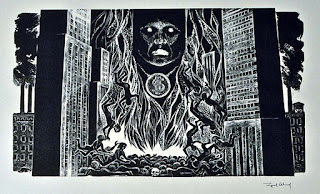It is kind of difficult to
start writing a post about Death of a
Salesman by Miller since it has so much to analyze and relate to the American
society. Even though the play is very short in length, it has so much content.
But, I will mostly focus in Willy Loman’s journey through the whole play.
Although the play has not had
an explicit or omnipresent narrator, we know that the story is told from Willy’s
perspective. Willy is so devastated by his constant failure in trying to
succeed, that he is becoming mentally insane up to a point that he prefers to
keep living in the past through memories of better times, when he was just started his
life and still has his dreams untouched by the US society:
“WILLY: Don’t say? Tell you
a secret, boys. Don’t breathe it to a soul. Someday I’ll have my own business,
and I’ll never have to leave home any more.”
Willy is letting their sons
know how important is to work hard, to get in the business, he seems to believe
that is the only way to succeed in life, and off course, he wants their sons to
remember this. He made a promise in front of their sons that he is determined
to achieve it.
We all have made promises to
somebody or to ourselves, and we give everything to accomplish them, and if we
broke them, we felt just horrible. Now, imagine this father promising to their
family that he is going to make it, that he is going to achieve the American
Dream, and then inevitably failing.
So for me, the exact part in
which Willy’s life broke into pieces is when his eldest son, Biff, returns
home. This gives Willy the feeling of not having achieved any success in his (Willy)
life at all.
His son is back, but without
having anything in life, without having a bright future, or at least, without
having the future Willy wanted for him. Willy always believed that Biff was
well qualified to become a man of success, so he didn’t see the reason of their
son’s “failure”
“WILLY: Biff Loman is lost.
In the greatest country in the world a young man with such—personal
attractiveness, gets lost. And such a hard worker. There’s one thing about
Biff— he’s not lazy.”
Since that moment Willy
start to get lost in the shadows of memories, in which he realize how much he
has failed in life, as a worker ( he felt he was never take into consideration
when it comes to work), as a husband ( he cheated on Linda ), and as a father (since
his son doesn’t find their way). So basically he is screw up by all this
memories, and he felt trapped in a life that he cannot manage, the American dream
and the society had promised him better opportunities, and all was just a lie,
and now he cannot come back to start all again… he is not able to forgive
himself for having lost his life trying to success in business, he cannot still
living on such horrible society, and he doesn’t really know how to escape.
Now, HOWL by Ginsberg totally fits here. We know that his poem is about
a self-destructive generation oppressed by a dominant culture, in this case the
American society or more obviously the American dream, which was overvalued.
The poem feels like it was
written for Death of a Salesman, in
fact, it seems to have been written in an angry tone, just the same as Willy
talks through most of the play.
The strongest connection
that I can make with the play and the poem is the one related to Moloch. This
beast that feeds on babies that were sacrificed by their own parents is totally
the representation of the American society feeding on Willy’s dreams to achieve
the American dream.
“What sphinx of cement and
aluminum bashed open their skulls and ate up
their brains and imagination? (…)”
“(…) Moloch the
incomprehensible prison! Moloch the crossbone soulless
jailhouse and Congress of
sorrows! Moloch whose buildings are judgment! Moloch the vast stone of war!
Moloch the stunned governments!
Moloch whose mind is pure
machinery! Moloch whose blood is running
money! (…)”
Willy is immerse in this
kind of Moloch society which he cannot defeat since he has contribute with his life
to support it. He had quit all his dreams, and personal life in order to success,
so he ended up sacrificing himself to Moloch in a more literal way (committing
suicide) in order to get absolved of his mistakes that he cannot carry on.





Hi, Claudia! By reading your entry I can tell that both of us felt the same way when reading both works you mentioned (Death of a Salesman and Howl). There is clearly a sense of frustration in the characters, and even a bit of nihilism. Even though the voice in Howl has the possibility to express all his frustration through the poem, it is not enough to completely accept reality. In the case of Willy, he has already accepted his life as it is, but fortunately one of his sons has realized that what his father taught them will not lead him to happiness.
ResponderEliminarRegards,
Vale.